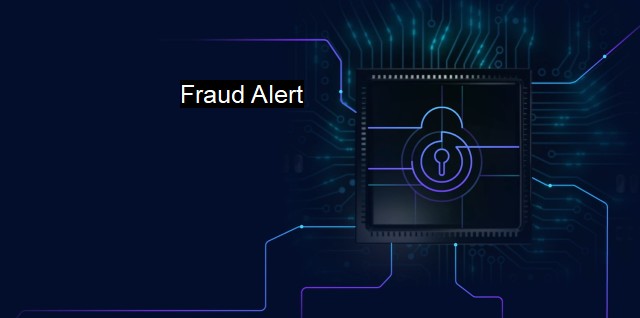What is Fraud Alert?
Fraud Alert: Mitigating Cybersecurity Threats with Effective Antivirus Measures - An Overview
A fraud alert is a security measure provided by credit bureaus and designed to protect consumers' financial information from potential misappropriation and exploitation. In the broader scope of cybersecurity and antivirus systems applications, fraud alerts serve as valuable tools to aid in protecting individuals against the unauthorized use of their personal and financial data, which can often lead to financial loss and substantial credit damage. Increasingly, with growing technological advancements and an upsurge in cybercrime, it has become imperative to accord priority to this defensive tool that can provide individuals with much-needed peace of mind regarding their financial safety.Broadly, a fraud alert warrants lending organizations to take the necessary extra steps in verifying your identification before giving ascent to certain lines of credit under your name. When this alert is placed on your credit report, you become much more resilent against identity theft attempts, as any suspicious or anomalous activities prompting the request for opening new accounts will be put through extra delineation checks. fraud alerts do not outright prevent new credit cards or account openings; they only ensure that financial institutions proceed with heightened caution.
It is important to note that fraud alerts function in synergy with common practices aimed at preventing unauthorized access to personal information. The presence of a fraud alert alone does not make one's financial data impervious to possible cyber or phishing attacks. It presupposes that antivirus software and other security measures are already in place, giving the individual or entity a holistic defense strategy against potential threats.
This aspect brings us to the relevance of antivirus software and other data protection measures used extensively in cybersecurity. Antivirus programs work tirelessly by scanning, identifying, and neutralizing harmful code or software that may gain unauthorized access or potentially damage the user's computer system. They serve as the first line of defense in preventing malware attacks and detecting any suspicious behavior in real time. Incorporating bot protection, network scanning, and intrusion detection features, these programs assist in barring out cyber threats and improving system performance.
The role of antivirus modules extends beyond functioning as malware wardens. With the assistance of anti-spyware options, data loss prevention features, and real-time threat intelligence, they assist in the broad-spectrum enforcement of preventing unauthorized access to sensitive personal and banking information.
Considering different types of fraud alerts, a temporary alert is typically set for one year, ideal for those who suspect fraudulent activity but are not quite certain. Extended alerts can last for seven years and are intended for victims of identity theft. Active duty military alerts are special alerts for military personnel about to deploy; these last for one year and can be renewed to match the period of deployment. These varied spectrums of fraud alert segmentation ensure protection under a wide range of circumstances.
So when pondering on what a fraud alert really is, it is a 'defense-in-depth strategy' incorporating a multitude of measures including robust antivirus mechanisms to safeguard the financial wholeness and digital sense of safety of individuals or organizations.
Living in the digital age has many benefits but requires vigilance in safeguarding personal financial data from potential cyber threats. Appropriate security planning should consider antivirus software as the basis for defending computer systems, while fraud alerts present another layer of security intended to protect against financial fraud. At the same time, it is essential to ensure regular monitoring and updating of antivirus software and the rules overseeing the functionality of fraud alert systems so as to constitute a solid formwork of safeguards against the modern-day challenges brought about by technological advancement.

Fraud Alert FAQs
What is a fraud alert?
A fraud alert is a feature that can be enabled by financial institutions or credit bureaus to help protect against identity theft or fraud attempts. It involves notifying the account holder or credit agencies when there is any suspicious activity detected on the account.How is a fraud alert different from a credit freeze?
A fraud alert involves notifying the account holder or credit bureaus about suspicious activity, while a credit freeze restricts access to the credit report altogether. With a credit freeze, new credit applications cannot be processed until the freeze is lifted.Can a fraud alert prevent all types of fraud?
No, a fraud alert cannot prevent all types of fraud, but it can make it more difficult for scammers to gain access to your personal information. You should still take other precautions, such as monitoring your accounts regularly and enabling two-factor authentication on your online accounts.How long does a fraud alert last?
The length of time a fraud alert lasts varies depending on the type of alert and the credit bureau or financial institution that issued it. Generally, fraud alerts last for 90 days, but they can be extended or renewed for longer periods of time. You can contact your bank or credit bureau to find out the duration of the fraud alert.| | A | | | B | | | C | | | D | | | E | | | F | | | G | | | H | | | I | | | J | | | K | | | L | | | M | |
| | N | | | O | | | P | | | Q | | | R | | | S | | | T | | | U | | | V | | | W | | | X | | | Y | | | Z | |
| | 1 | | | 2 | | | 3 | | | 4 | | | 7 | | | 8 | | |||||||